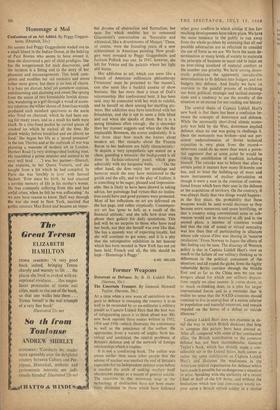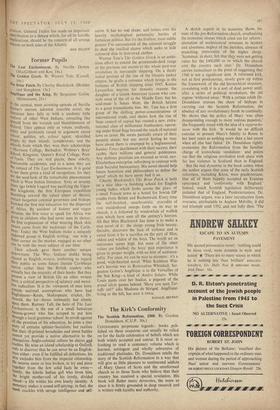Former Weapons
AT a time when a new wave of ostrichism in re- gard to defence is sweeping the country it is as well to be reminded by so un-militarist a military pundit as Captain Liddell Hart that the best way of safeguarding peace is to think about war. His new book reprints three essays written in 1952, 1954 and 1956—which illustrates the consistency as well as the prescience of the author. He approaches from a variety of angles, both his- torical and analytical, the central problems of Britain's defence and of the network of foreign relationships which it implies.
It is not a comforting book. The author was aware earlier than some Other people that the advent of nuclear war marked the end of Britain's capacities for an independent defence even before it reached the pitch of making warfare itself obsolescent except as a means of general suicide. The reactions to this enormous leap in the technology of destruction have not been essen- tially dissimilar to those which have followed other great conflicts in which similar if less far• reaching developments have taken place. We have the same tendency in the public to run away from the whole problem by assuming that all our possible adversaries arc as reluctant to consider the use of force as we arc. We have the same de- termination at many levels of society to maintain the principle of business as usual and to insist on an ever-rising standard of material comfort as the number one priority. We have among demo- cratic politicians the apparently ineradicable determination to fit defence into budgets and not budgets into defence. And finally we have an aversion to the painful process of re-thinking our basic political, strategic and tactical assump- tions and a tendency to use the novelty of the situation as an excuse for not reading our history.
The central thesis of Captain Liddell Hart's new book is that there has been a confusion be- tween the concepts of deterrence and defence. While the necessarily short-lived atomic mono- poly was held by the West, deterrence implied defence, since no one was going to challenge it. Once the monopoly was broken—and our per- sistent underestimation of Soviet technical capacities is very plain from the record— deterrents could do no more than warn a poten- tial aggressor that at some point he would he risking the annihilation of mankind, including himself. The mistake was to believe that after a certain point it matters how many H-bombs one has, and to treat the building-up of more and more instruments of nuclear devastation as though it were a race in the creation of conven- tional forces which have their uses in the defence or the acquisition of territory. On the contrary, it was always likely that two things would happen: in the first place, the probability that these weapons would be used would decrease as they became more numerous and more horrifying, so that a country using conventional arms or sub- version would not be deterred at all; and in the second place, a number of countries would feel that the risk of actual or virtual neutrality was less than that of participating in alliances whose sole raison d'etre was sharing in 'massive retaliation.' From Norway to Japan the effects of this feeling can be seen. The disarray of Western policy is due in Captain Liddell Hart's view as much to the failure of our military thinking as to differences in the political assessment of the situation: and all round the globe, from the highly vulnerable Berlin corridor through the Middle East and as far as the China seas we can see dangers ahead for which our military disposi- tions supply no clear answer. It comes down, as so much re-thinking does, to a plea for larger conventional forces and to a reminder that 'it makes no sense that the NATO countries should continue to live in mortal fear of a nation inferior in population and material resources, and remain impaled on the horns of a defeat or suicide dilemma.'
Captain Liddell Hart does not examine in de- tail the way in which British decisions that help to compose this picture have been arrived at. After all, compared with some of her continental allies, the British contribution to the common defence has not been inconsiderable. General Taylor's book, which has already made a con- siderable stir in the United States, both conies 10 rather the same conclusions as Captain Liddell Hart's and discusses the weaknesses in the American central organisation for defence which have made it possible for so dangerous a situation to arise. Speaking with the authority of a recent Chief of Staff of the US Army, and without the limitations which law and convention would im- pose upon a British retired soldier in a similar Position, General Taylor has made an important Contribution to a debate which, for all its horrific Implications, should be the concern of all serious citizens on both sides of the Atlantic.
MAX BELOFF







































 Previous page
Previous page